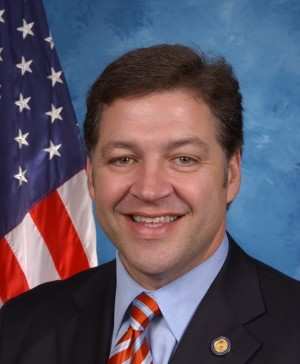Remarks Come In A Speech To The International Aviation Club
Representative Bill Shuster (R-PA), Chair of the House Transportation Committee, outlined his vision for the future of aviation in a speech Wednesday to the International Aviation Club in Washington, D.C.

In his speech, Chairman Shuster said that "This critical segment of our economy provides millions of American jobs and is essential to our competitiveness. And it’s responsible for over a trillion dollars in economic activity every year – over 5% of GDP. It is important that we work together to protect and strengthen this vital pillar of our economy. Our aviation system, and the federal laws that provide for its structure, must evolve and modernize."
Shuster said that while the FAA reauthorization passed last year does not expire until 2015, the time to ask questions in now. "Our global competitors are closing the gap quickly. For example, air carriers in the Middle East and China are emerging as top carriers in terms of revenue and capacity. In these regions, governments are strategically using airlines to drive economic growth – and they’re not necessarily concerned about turning a profit. In some cases the government itself owns and operates the airlines, and those carriers benefit from low fees and taxes, low labor costs, and relaxed labor regulations. Another thing we have to keep in mind is that U.S. carriers must adhere to requirements and rigorous reporting standards that foreign carriers do not – for financial data, fare information, operations and route traffic, for example."
Chairman Shuster also said that General Aviation is an important piece of the overall aviation picture. "U.S. certification is considered a gold standard in aviation, but it’s a long, complex, and expensive process. The European Aviation Safety Agency may have some advantages here over the FAA – being a comparatively new agency could be one.
"But more to the point, EASA’s oversight of new product certification takes a broad approach focused on compliance, rather than looking at individual components involved in certifying a new airplane. This allows EASA to focus more on areas of high risk, and less on areas of low risk.
"Congress recently passed the Small Airplane Revitalization Act to streamline the certification of small aircraft. Can we use a similar approach, and elements of the faster European process to improve our other certification processes? Ensuring a safe and efficient process will help keep U.S. manufacturers on the cutting edge of technology. And it is vital to their ability to compete domestically and globally.
Shuster said he has asked the DOT IG and the GAO to look closely at NextGen’s status, because we need new ideas to ensure this effort fulfills its promise. "I’ve also asked the GAO to look into growing concerns of a future shortage of pilots and other aviation professionals," he said. "Simply put, our aviation system doesn’t exist without these important and skilled people. How can we foster the necessary enthusiasm for aviation in current and future generations?
"Another problem with the status quo is that the government and the Administration treat airline passengers like piggy banks. I believe there are 17 different federal aviation taxes and fees, much of it passed on to the consumer, including: the 7.5 percent transportation tax; the nearly $4 per flight segment tax; the $2.50 security tax; and a range of passenger facility charges (up to $18).
"The Administration also continues to propose an additional $100 tax on aviation operators. Taxes alone already can account for up to 20 percent of the cost of an airline ticket. We can’t follow some of the Europeans in that regard, where taxes can be double that amount – or more. We can’t tax our passengers to death."
Shuster said that Congress needs to hear from the aviation industry as the next FAA authorization is being crafted. "Let’s work together to answer the primary question: What is best for the future of our aviation system?"
He concluded by saying that a healthy aviation system – as part of a complex and interconnected transportation network – is not just important for this community, it’s important for creating jobs and keeping us competitive. "Our shared goal is to keep America the world leader in Aviation. I look forward to working with everyone to achieve that goal."
 ANN's Daily Aero-Linx (05.02.24)
ANN's Daily Aero-Linx (05.02.24) ANN's Daily Aero-Term (05.02.24): Touchdown Zone Lighting
ANN's Daily Aero-Term (05.02.24): Touchdown Zone Lighting Aero-News: Quote of the Day (05.02.24)
Aero-News: Quote of the Day (05.02.24) ANN FAQ: Contributing To Aero-TV
ANN FAQ: Contributing To Aero-TV NTSB Final Report: Cirrus Design Corp SR20
NTSB Final Report: Cirrus Design Corp SR20



